Top Red Cross Training for Phlebotomy: Your Path to Certification
Searching for insights into Red Cross training for phlebotomy? Although the Red Cross has discontinued phlebotomy training, this article will guide you through what they used to provide, where to find alternative accredited programs, and the importance of proper training in phlebotomy.
Key Takeaways
- The Red Cross no longer offers phlebotomy training, leading students to seek alternatives like Northeast Medical Institute’s robust Phlebotomy Tech course.
- Key components of phlebotomy training include mastering venipuncture techniques, adhering to safety procedures, and proper sample handling, with a focus on hands-on experience.
- Graduates of phlebotomy training enhance their job prospects through certification, which is not mandatory but significantly increases employability and potential salary.
- Extra training can further enhance job prospects and potential salaries, distinguishing candidates in the job market and facilitating faster employment opportunities.
Overview of Red Cross Phlebotomy Training Programs
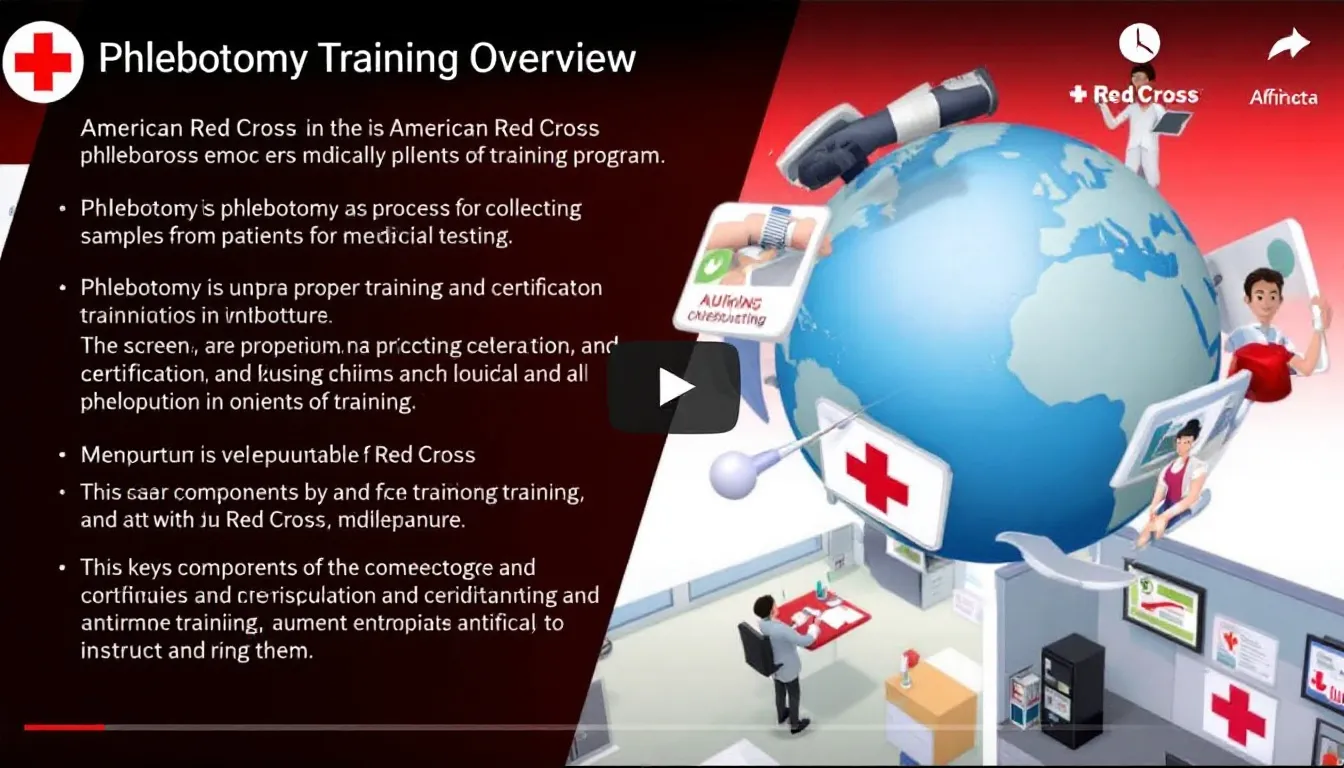
The Red Cross phlebotomy training programs are renowned for their comprehensive and flexible structure, designed to cater to a variety of learning styles. Whether you’re a hands-on learner or someone who thrives in a classroom setting, the American Red Cross phlebotomy training is known for its reputation and flexibility, making it a reputable option for individuals aspiring to enter the healthcare field. Known for their high-quality and commitment to safety, these programs have earned a stellar reputation in the healthcare industry.
However, it’s worth noting that the Red Cross no longer offers phlebotomy training. This has led many prospective students to seek alternatives, such as the Northeast Medical Institute. Their Phlebotomy Tech course offers a robust solution, providing the same level of hands-on experience and rigorous training that the Red Cross was known for. The Northeast Medical Institute’s program ensures that students gain the practical skills needed to excel in the field.
For those still interested in the Red Cross, it’s essential to explore other training programs they offer, such as CPR and first aid courses, which are integral to a well-rounded healthcare education. These programs emphasize the same principles of quality education, experienced instructors, and a commitment to safety that the American Red Cross training has always stood for.
Course Duration and Costs
The phlebotomy training program at the Red Cross typically lasts around 120 hours, broken down into 80 hours of classroom instruction and 40 hours of hands-on lab work. This approach ensures students are well-versed in both theoretical and practical aspects of phlebotomy.
The total cost of the Red Cross program is competitively priced at $965, which includes tuition, course materials, and lab work. This pricing is in line with other training programs, which generally range from $700 to $1,500.
Classroom and Hands-On Lab Work
The training program’s blend of 80 hours of classroom preparation and 40 hours of hands-on lab work offers a thorough grounding in complete phlebotomy training courses, teaching the necessary skills that enhance employability, with nearly half of the time dedicated to practical experience. Classroom instruction covers the basics of phlebotomy, including the science behind blood drawing and essential safety procedures.
The lab work provides students with the opportunity to gain valuable experience by practicing to draw blood on a training arm under the supervision of experienced instructors. This hands-on practice is crucial for building the practical skills needed to succeed in the field.
Key Components of Red Cross Phlebotomy Training
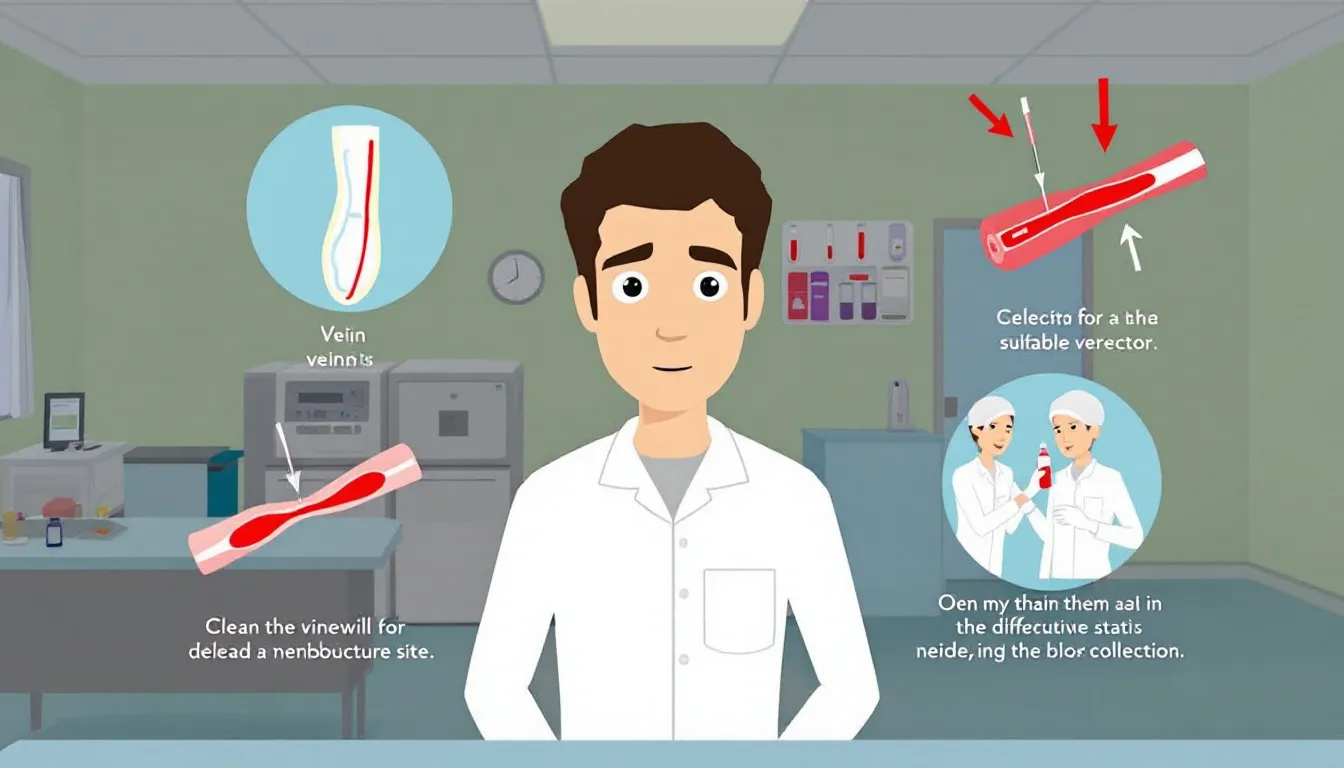
The Red Cross phlebotomy training program is recognized for its comprehensive approach that combines theoretical knowledge with practical skills. Key components of the training include mastering venipuncture techniques, adhering to strict safety procedures, and ensuring accurate labeling and handling of blood samples. The program also emphasizes teaching life saving skills as part of a broader educational framework, preparing individuals to respond effectively in emergencies and crises.
These elements are essential for anyone looking to excel in the phlebotomy field, as attention to detail and a commitment to safety are critical.
Venipuncture Techniques
One of the most critical aspects of phlebotomy training is learning various venipuncture techniques. Students are taught both butterfly venipuncture and syringe venipuncture, which are essential for drawing blood from patients with different vein conditions. Not every patient will have a visible vein, so learning different venipuncture techniques is crucial to accommodate various patient anatomies. The practical lab sessions help students gain confidence in their ability to perform these techniques accurately and efficiently.
This training ensures that aspiring phlebotomists are well-prepared to handle the challenges of real-world blood collection.
Safety Procedures and Protective Equipment
Safety training is a cornerstone of the Red Cross phlebotomy program, emphasizing the importance of adhering to safety rules to protect both patients and practitioners. The program covers essential safety procedures, including infection control practices and the proper use of personal protective equipment like gloves and goggles.
Hands-on practice of these safety protocols ensures that students are well-prepared to handle real-world scenarios while adhering to standard safety procedures.
Proper Labeling and Sample Handling
Proper labeling and handling of blood samples are essential for accurate diagnostic outcomes, especially in blood tests. The Red Cross phlebotomy training emphasizes the importance of correctly labeling blood samples to avoid contamination and ensure reliability. Attention to detail in these procedures is crucial, as even minor errors can lead to significant issues in patient care and diagnosis.
Certification Exam Benefits
Graduates of the Red Cross phlebotomy program have the opportunity to take the certification exam through the National Healthcare Association (NHA). While certification is not mandatory, it significantly enhances a phlebotomist’s qualifications and employability, particularly for those pursuing an entry level career in the healthcare profession.
The strong reputation of the Red Cross adds considerable weight to the credentials of its graduates, making them appealing to potential employers across various healthcare settings, especially from such a recognized organization.
Enhancing Job Prospects
Completing phlebotomy training through the Red Cross opens up numerous job opportunities and can lead to more favorable hiring conditions. For aspiring healthcare professionals, certification is crucial as it enhances job prospects and supports career advancement in the healthcare field. Certified phlebotomists often find work more quickly and typically earn higher salaries compared to their non-certified counterparts.
The comprehensive training and certification make candidates more reliable and attractive to employers.
Preparation for the Exam
The certification exam preparation encompasses both theoretical knowledge and a solid understanding of safety protocols and practical skills. The various types of training offered by the Red Cross, including their phlebotomy training program, cover these critical aspects, ensuring that students are well-prepared for the certification exam through the National Association of Health Professionals.
Additional training and hands-on practice are often necessary to successfully pass the exam and gain certification.
Who Can Apply for Red Cross Phlebotomy Training?
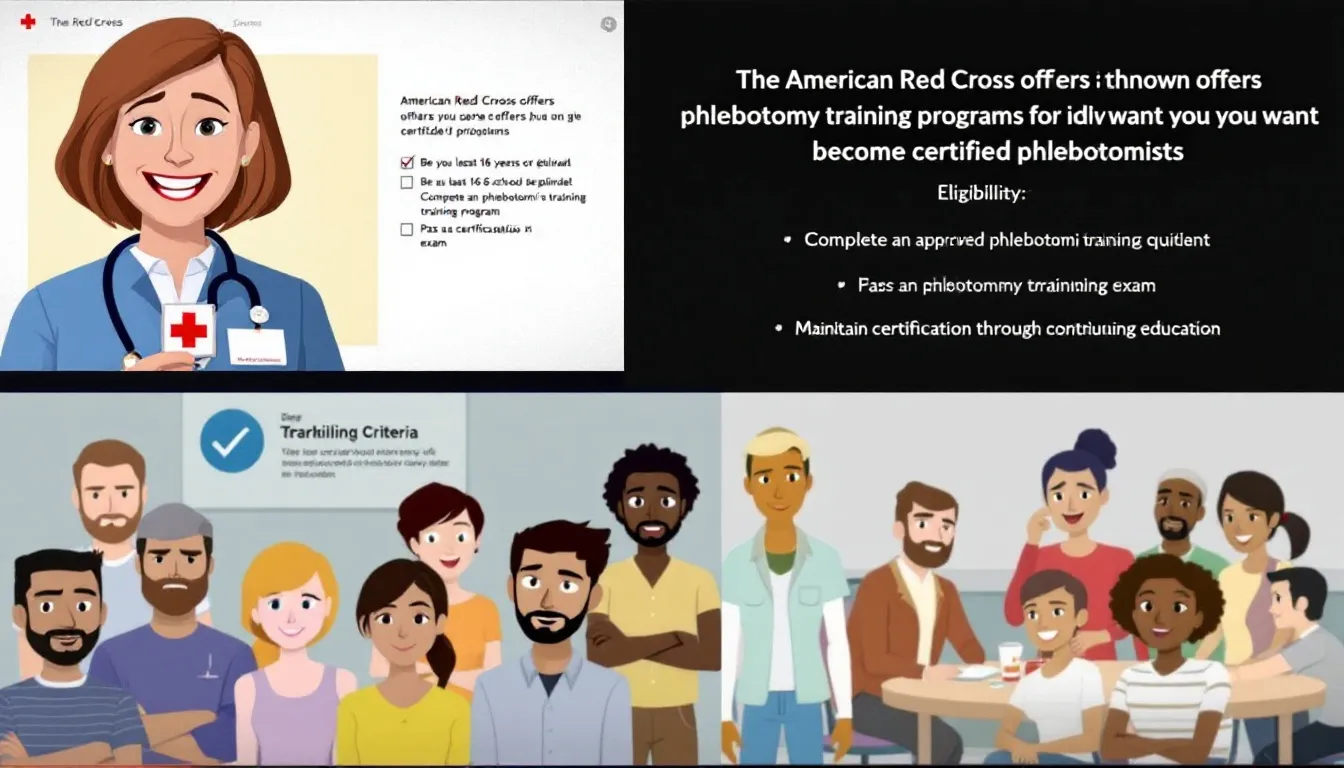
The Red Cross phlebotomy training program is open to anyone who meets the basic requirements. There are no specific job obligations or volunteering requirements after completing the training. This flexibility makes it an attractive option for a wide range of individuals, from those starting a career in the medical field to first responders and health professionals seeking to enhance their skills.
Ideal Candidates
Ideal candidates for the Red Cross phlebotomy training include individuals starting a medical career, first responders, and medical professionals seeking to enhance their skills. The intensive program, which includes ECG technician training and CPR, is particularly beneficial for first responders.
Completing the online training makes candidates more reliable and appealing to potential employers.
Prerequisites
Applicants must be at least 18 years old and hold a high school diploma or GED to enroll in the Red Cross phlebotomy training program. These prerequisites ensure students have the foundational education needed to grasp the complex concepts and practical skills taught in the program, paving the way for potential career advancement into specialized roles, including a supervisory position within the medical field.
Career Opportunities Post-Training
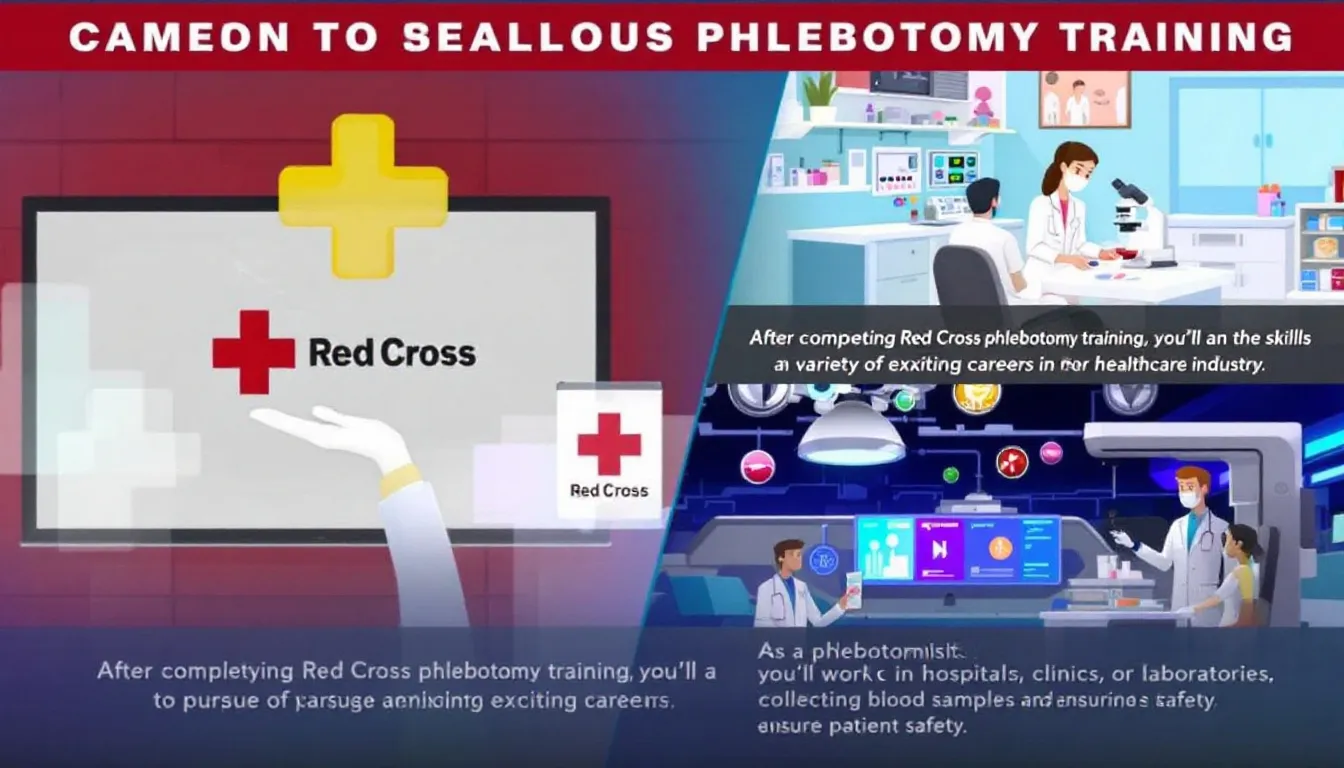
Certified phlebotomists often experience a broader range of job opportunities across various healthcare settings. Employers prefer hiring certified professionals due to the assurance of their skills and knowledge.
The Red Cross supports its graduates in job searching, leveraging its extensive network in the healthcare field. This support includes job placement assistance, guidance on job search strategies, and interview preparation.
Employment Settings
Phlebotomists can find employment in a variety of healthcare settings, including hospitals, emergency clinics, private practices, local blood banks, blood banks, and mobile phlebotomy services. Additionally, they frequently work in laboratories and blood donation centers, providing essential services in these environments.
Mobile Phlebotomy
Mobile phlebotomy offers phlebotomists the flexibility to work in various locations rather than being tied to a single facility. A mobile phlebotomist must excel in teamwork and organizational skills, as they often work alongside other healthcare staff while managing diverse patient interactions in various locations. This role allows professionals to create their own schedules and choose their work locations, providing a dynamic and varied career path.
Mobile phlebotomists play a crucial role in expanding access to blood collection services across different communities, which is essential for maintaining the nation’s blood supply.
Skills Needed for Success in Phlebotomy
Success in phlebotomy requires a combination of technical skills, personal characteristics, and physical stamina. Key skills include adaptability, attention to detail, organizational skills, effective communication, and physical fitness. Reputable training programs, such as those offered by the Red Cross, teach the necessary skills that enhance employability and ensure participants are well-prepared for the field.
These skills are essential for performing the job properly and ensuring patient care.
Organizational Skills
Strong organizational skills are crucial for phlebotomists to manage blood samples effectively and prepare equipment. Being detail-oriented helps avoid errors in labeling and sample handling.
Phlebotomists should evaluate their ability to work in a fast-paced environment where attention to detail is critical.
Communication and Interpersonal Skills
Effective communication is vital for ensuring patient comfort and understanding during procedures. Phlebotomists must be able to explain procedures clearly and reassure patients, which helps build trust and confidence.
Physical Stamina
Phlebotomists need physical stamina to stand for long periods and move around during their shifts. The physical demands of the job require practitioners to maintain good physical fitness.
Reflecting on your ability to work under pressure and in physically demanding environments is essential for assessing suitability for this role.
Volunteer Opportunities for Phlebotomists
Volunteering as a phlebotomist at a Red Cross blood drive provides hands-on experience and enhances skills in real-world settings. Opportunities include participating in blood drives, community health events, and other outreach initiatives to collect blood donations.
Volunteering helps build networks in the healthcare community and improves job prospects.
Red Cross Blood Drives
Red Cross blood drives offer various volunteer opportunities for phlebotomists. As Blood Donor Ambassadors, volunteers help create a welcoming atmosphere, ensuring a positive experience for donors and encouraging future donations.
Participating in these drives enhances networking opportunities within the healthcare community and plays a crucial role in maintaining the nation’s blood supply.
Other Organizations
Various organizations, including hospitals and blood drives, depend on the volunteer work of qualified phlebotomists. In addition to phlebotomy training, individuals can explore other programs offered by organizations like the American Red Cross, which can complement their skills and broaden their career prospects in the healthcare sector. Volunteer opportunities at these organizations provide valuable experience and help build strong organizational skills that are crucial in the healthcare field.
Advancement in Phlebotomy Careers
Advanced training in phlebotomy can lead to promotions, specialty choices, and greater career flexibility. Starting in entry-level roles, phlebotomists can gain experience and move on to specialized positions, such as a therapeutic phlebotomist, or supervisory roles.
Phlebotomy often serves as a gateway into various medical roles, contributing to professional growth and career advancement.
Further Education and Specialization
Career advancement opportunities in phlebotomy include continued education, advanced training, and specialization in areas like therapeutic phlebotomy, driven by the increasing need for more blood tests to diagnose various illnesses and conditions. Gaining more experience and enrolling in multiple training programs can significantly enhance job prospects in the healthcare industry.
Supervisory and Instructor Roles
Experienced phlebotomists, who often begin their careers in a starting position, have the opportunity to transition into supervisory or instructional roles. These positions allow them to enhance their leadership skills and contribute to training new generations of phlebotomists.
Moving into roles such as laboratory supervisors or lead training instructors provides career advancement and the chance to influence the future of the profession.
Benefits of Training with the Red Cross
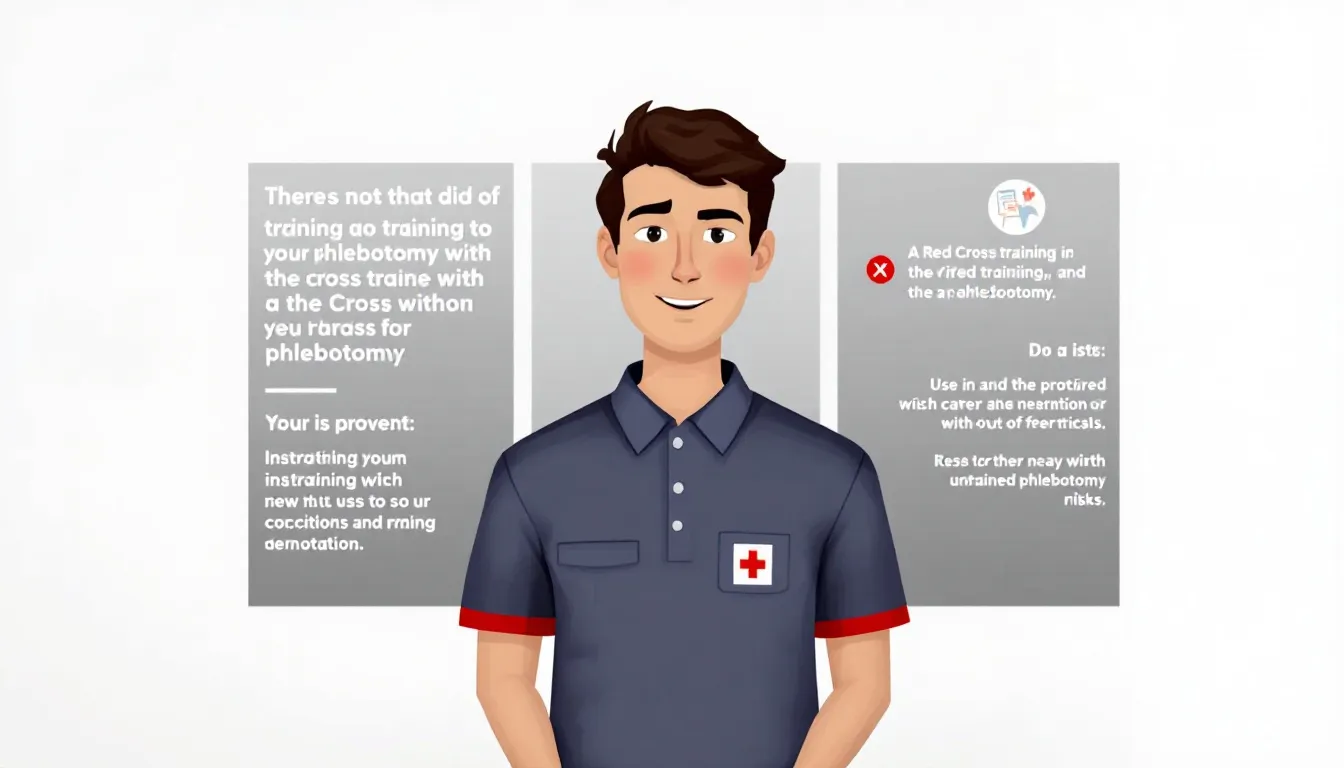
Training with the Red Cross offers numerous benefits, including quality education, experienced instructors, and job placement assistance. The Red Cross is a trusted organization, recognized for its comprehensive phlebotomy training programs that align with industry standards. Financial assistance options are also available through local American Red Cross chapters, making training more accessible. This training is crucial as it not only enhances career prospects but also contributes to critical health services that save lives.
Quality Education and Experienced Instructors
The Red Cross phlebotomy training is known for its rigorous curriculum, experienced instructors, and convenient locations. With a comprehensive education that includes CPR training, students are well-prepared for their careers in phlebotomy. Red Cross instructors teach millions of people each year, bringing extensive experience to the classroom.
This combination of high-quality education and hands-on practice ensures that students gain valuable experience in a supportive learning environment.
Job Placement Assistance
The Red Cross provides comprehensive job placement assistance to its phlebotomy training graduates. The training programs are tailored to equip students with the skills and knowledge necessary for employment in the health care field. Through rigorous training and ongoing support, the Red Cross facilitates successful job placements for its graduates in various healthcare settings.
Is Red Cross Phlebotomy Training Right for You?
Determining if Red Cross phlebotomy training is right for you involves assessing your personal and professional goals. Phlebotomy technicians play a foundational role in the healthcare field, serving as both an entry-level position and a springboard for career advancement. Patience, empathy, and clear communication are essential for interacting with patients and explaining procedures.
Graduates gain valuable volunteer experience, enhancing their skills and employability in the healthcare field. Professionalism and a commitment to patient care are crucial for building trust and confidence among patients.
Self-Assessment Questions
Prospective students should conduct a self-assessment to gauge their readiness for a career in phlebotomy. Consider your interest in patient care, comfort with blood collection procedures, and ability to maintain professionalism under pressure.
Reflecting on these critical aspects can help determine if this career path aligns with your personal and professional aspirations. Additionally, understanding the challenges of drawing blood from an obese person and learning various techniques for blood collection are crucial for handling diverse patient needs effectively.
Summary
In summary, the Red Cross phlebotomy training program offers a comprehensive and flexible approach to education, combining theoretical knowledge with practical skills. The benefits of certification, enhanced job prospects, and numerous career opportunities, including the potential to move into a supervisory position, make this training a valuable investment in your future. Whether you seek to start a medical career, advance in the healthcare field, or volunteer, Red Cross training provides the foundation you need. By reflecting on your personal goals and readiness, you can determine if this path is right for you. Remember, a career in phlebotomy is not just about drawing blood—it’s about making a difference in patient care and the healthcare community.
Frequently Asked Questions
What is the duration and cost of the Red Cross phlebotomy training program?
The Red Cross phlebotomy training program lasts 120 hours, consisting of 80 hours of classroom instruction and 40 hours of hands-on lab work, with a total cost of $965.
What are the key components of the Red Cross phlebotomy training?
The key components of Red Cross phlebotomy training are venipuncture techniques, safety procedures, and proper labeling and sample handling. These elements ensure proficiency and safety in blood collection practices.
How can certification enhance my job prospects?
Certification significantly enhances job prospects by making candidates more appealing to employers, often resulting in quicker employment and higher salaries.
Who can apply for the Red Cross phlebotomy training?
To apply for Red Cross phlebotomy training, you must be at least 18 years old and possess a high school diploma or GED.
What are the career opportunities after completing the training?
Completing the training opens various career opportunities in hospitals, emergency clinics, private practices, blood banks, and mobile phlebotomy, with potential advancement to supervisory or instructional roles. These pathways can lead to a fulfilling and diverse professional life.

